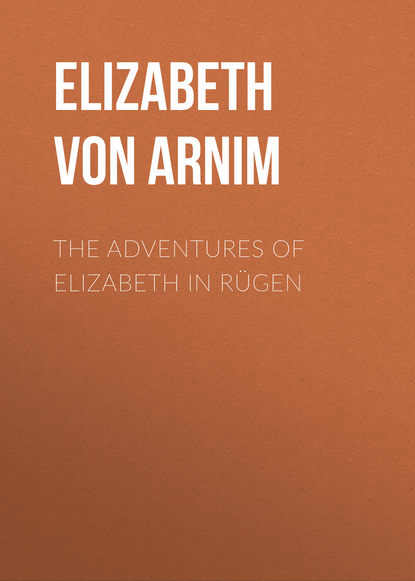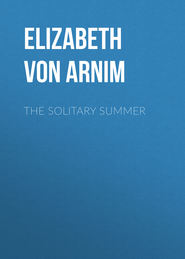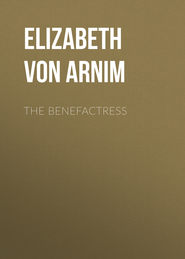По всем вопросам обращайтесь на: info@litportal.ru
(©) 2003-2024.
✖
The Adventures of Elizabeth in Rügen
Настройки чтения
Размер шрифта
Высота строк
Поля
'The tea is getting very cold,' called out Mrs. Harvey-Browne plaintively. She had been watching us with impatience, and seemed perturbed. The moment we got near enough she informed us that the tourists were such that no decent woman could stand it. 'Ambrose has gone off with one of them,' she said,—'a most terrible old man—to look at some view over there. Would you believe it, while we were quietly sitting here not harming anybody, this person came up the hill and immediately began to talk to us as if we knew each other? He actually had the audacity to ask if he might sit with us at this table, as there was no room elsewhere. He was most objectionable. Of course I refused. The most pushing person I have met at all.'
'But there is ample room,' said Charlotte, to whom everything the bishop's wife said and did appeared bad.
'But, my dear Frau Nieberlein, a complete stranger! And such an unpleasantly jocular old man. And I think it so very ill-bred to be jocular in the wrong places.'
'I always think it a pity to cold-shoulder people,' said Charlotte sternly. She was not, it seemed, going to stand any nonsense from the bishop's wife.
'You must be dying for some tea,' I interposed, pouring it out as one who should pour oil on troubled waters.
'And you should consider,' continued Charlotte, 'that in fifty years we shall all be dead, and our opportunities for being kind will be over.'
'My dear Frau Nieberlein!' ejaculated the astonished bishop's wife.
'Why, it isn't certain,' I said. 'You'll only be eighty then, Charlotte, and what is eighty? When I am eighty I hope to be a gay granddame skilled in gestic lore, frisking beneath the burthen of fourscore.'
But the bishop's wife did not like being told she would be dead in fifty years, and no artless quotations of mine could make her like it; so she drank her tea with an offended face. 'Perhaps, then,' she remarked, 'you will tell me I ought to have accepted the proposal one of the other tourists, a woman, made me a moment ago. She suggested that I should drive back to Sassnitz with her and her party, and halve the expense of the fly.'
'Well, and why should you not?' said Charlotte.
'Why should I not? There were two excellent reasons why I should not. First, because it was an impertinence; and secondly, because I am going back in the boat.'
'The second reason is good, but you must pardon my seeing no excellence whatever in the first.'
'Your son's tea will be undrinkable,' I said, feebly interrupting. I can never see two people contradicting each other without feeling wretched. Why contradict? Why argue at all? Only one's Best-Beloved, one's Closest and Most Understanding should be contradicted and argued with. How simple to keep quiet with all the rest and agree to everything they say. Charlotte up to this had kept very quiet in the presence of Mrs. Harvey-Browne, had said yes in the right places, and had only been listless and bored. Now, after reading her own explosive pamphlet for an hour, stirred besides by the widow's base behaviour and by the failure of her effort to induce penitence in Hedwig by means of punishment, she was in the strenuous mood again, and inclined to see all manner of horrid truths and fates hovering round the harmless tea-table, where denser eyes like mine, and no doubt Mrs. Harvey-Browne's, only saw a pleasant flicker of beech leaves over cups and saucers, and bland strawberries in a nest of green.
'If women did not regard each other's advances with so much suspicion,' Charlotte proceeded emphatically, 'if they did not look upon every one of a slightly different class as an impossible person to be avoided, they would make a much better show in the fight for independent existence. The value of co-operation is so gigantic–'
'Ah yes, I fancy I remember your saying something like this at that lecture in Oxford last winter,' interrupted Mrs. Harvey-Browne with an immense plaintiveness.
'It cannot be said too often.'
'Oh yes dear Frau Nieberlein, believe me it can. What, for instance, has it to do with my being asked to drive back to Sassnitz with a strange family in a fly?'
'Why, with that it has very much to do,' I interposed, smiling pleasantly on them both. 'You would have paid half. And what is co-operation if it is not paying half? Indeed, I've been told by people who have done it that it sometimes even means paying all. In which case you don't see its point.'
'What I mean, of course,' said Charlotte, 'is moral co-operation. A ceaseless working together of its members for the welfare of the sex. No opportunity should ever be lost. One should always be ready to talk to, to get to know, to encourage. One must cultivate a large love for humanity to whatever class it belongs, and however individually objectionable it is. You, no doubt,' she continued, waving her teaspoon at the staring bishop's wife, 'curtly refused the very innocent invitation of your fellow-creature because she was badly dressed and had manners of a type with which you are not acquainted. You considered it an impertinence—nay, more than an impertinence, an insult, to be approached in such a manner. Now, how can you tell'—(here she leaned across the table, and in her earnestness pointed the teaspoon straight at Mrs. Harvey-Browne, who stared harder than ever)—'how will you ever know that the woman did not happen to be full, full to the brim, of that good soil in which the seed of a few encouraging words dropped during your drive would have produced a splendid harvest of energy and freedom?'
'But my dear Frau Nieberlein,' said the bishop's wife, much taken aback by this striking image, 'I do not think she was full of anything of the kind. She did not look so, anyhow. And I myself, to pursue your metaphor, am hardly fitted for the office of an agricultural implement. I believe all these things are done nowadays by machinery, are they not?' she asked, turning to me in a well-meant effort to get away from the subject. 'The old-fashioned and picturesque sower has been quite superseded, has he not?'
'Why are you talking about farming?' asked Ambrose, who came up at this moment.
'We are talking of the farming of souls,' replied Charlotte.
'Oh,' said Ambrose, in his turn taken aback. He pretended to be so busy sitting down that he couldn't say more than just Oh. We watched him in silence fussing into his chair. 'How pleasant it is here,' he went on when he was settled. 'No, I don't mind cold tea a bit, really. Mother, why wouldn't you let the old man sit with us? He's a frightfully good sort.'
'Because there are certain limits beyond which I decline to go,' replied his mother, visibly annoyed that he should thus unconsciously side with Charlotte.
'Oh but it was rough on him—don't you think so, Frau Nieberlein? We have the biggest table and only half-fill it, and there isn't another place to be had. It is so characteristically British for us to sit here and keep other people out. He'll have to wait heaven knows how long for his coffee, and he has walked miles.'
'I think,' said Charlotte slowly, loudly, and weightily, 'that he might very well have joined us.'
'But you did not see him,' protested Mrs. Harvey-Browne. 'I assure you he really was impossible. Much worse than the woman we were talking about.'
'I can only say,' said Charlotte, even slower, louder, and more weightily, 'that one should, before all things, be human, and that one has no right whatever to turn one's back on the smallest request of a fellow-creature.'
Hardly had she said it, hardly had the bishop's wife had time to open her mouth and stare in stoniest astonishment, hardly had I had time to follow her petrified gaze, than an old man in a long waterproof garment with a green felt hat set askew on his venerable head, came nimbly up behind Charlotte, and bending down to her unsuspecting ear shouted into it the amazing monosyllable 'Bo!'
THE SEVENTH DAY—Continued
AT STUBBENKAMMER
I believe I have somewhere remarked that Charlotte was not the kind of person one could ever tickle. She was also the last person in the world to whom most people would want to say Bo. The effect on her of this Bo was alarming. She started up as though she had been struck, and then stood as one turned to stone.
Brosy jumped up as if to protect her.
Mrs. Harvey-Browne looked really frightened, and gasped 'It is the old man again—an escaped lunatic—how very unpleasant!'
'No, no,' I hurriedly explained, 'it is the Professor.'
'The Professor? What, never the Professor? What, the Professor? Brosy—Brosy'—she leaned over and seized his coat in an agony of haste—'never breathe it's the old man I've been talking about—never breathe it—it's Professor Nieberlein himself!'
'What?' exclaimed Brosy, flushing all over his face.
But the Professor took no notice of any of us, for he was diligently kissing Charlotte. He kissed her first on one cheek, then he kissed her on the other cheek, then he pulled her ears, then he tickled her under the chin, and he beamed upon her all the while with such an uninterrupted radiance that the coldest heart must have glowed only to see it.
'So here I meet thee, little treasure?' he cried. 'Here once more thy twitter falls upon my ears? I knew at once thy little chirp. I heard it above all the drinking noises. "Come, come," I said to myself, "if that is not the little Lot!" And chirping the self-same tune I know of old, in the beautiful English tongue: Turn not your back on a creature, turn not your back. Only on the old husband one turns the pretty back—what? Fie, fie, the naughty little Lot!'
I protest I never saw a stranger sight than this of Charlotte being toyed with. And the rigidity of her!
'How charming the simple German ways are,' cried Mrs. Harvey-Browne in a great flutter to me while the toying was going on. She was so torn by horror at what she had said and by rapture at meeting the Professor, that she hardly knew what she was doing. 'It really does one good to be given a peep at genuine family emotions. Delightful Professor. You heard what he said to the Duke after he had gone all the way to Bonn on purpose to see him? And my dear Frau X., such a Duke!' And she whispered the name in my ear as though it were altogether too great to be said aloud.
I conceded by a nod that he was a very superior duke; but what the Professor said to him I never heard, for at that moment Charlotte dropped back into her chair and the Professor immediately scrambled (I fear there is no other word, he did scramble) into the next one to her, which was Brosy's.
'Will you kindly present me?' said Brosy to Charlotte, standing reverential and bare-headed before the great man.
'Ah, I know you, my young friend, already,' said the Professor genially. 'We have just been admiring Nature together.'
At this the bishop's wife blushed, deeply, thoroughly, a thing I suppose she had not done for years, and cast a supplicating look at Charlotte, who sat rigid with her eyes on her plate. Brosy blushed too and bowed profoundly. 'I cannot tell you, sir, how greatly honoured I feel at being allowed to make your acquaintance,' he said.
'Tut, tut,' said the Professor. 'Lottchen, present me to these ladies.'
What, he did not remember me? What, after the memorable evening in Berlin? I know of few things more wholly grievous than to have a celebrated connection who forgets he has ever seen you.
'I must apologise to you, madam,' he said to the bishop's wife, for taking a seat at your table after all.'
'Oh, Professor–' murmured Mrs. Harvey-Browne.
'But you will perhaps forgive my joining a party of which my wife is a member.'











